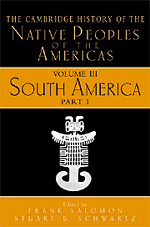Book contents
- Frontmatter
- Contents
- List of Illustrations
- Introduction
- 1 Testimonies: The Making and Reading of Native South American Historical Sources
- 2 Ethnography in South America: The First Two Hundred Years
- 3 The Earliest South American Lifeways
- 4 The Maritime, Highland, Forest Dynamic and the Origins of Complex Culture
- 5 The Evolution of Andean Diversity: Regional Formations (500 B.C.E.–C.E. 600)
- 6 Andean Urbanism and Statecraft (c.E. 550–1450)
- 7 Chiefdoms: The Prevalence and Persistence of “Señoríos Naturales” 1400 to European Conquest
- 8 Archaeology of the Caribbean Region
- 9 Prehistory of the Southern Cone
- 10 The Fourfold Domain: Inka Power and Its Social Foundations
- 11 The Crises and Transformations of Invaded Societies: The Caribbean (1492–1580)
- 12 The Crises and Transformations of Invaded Societies: Andean Area (1500–1580)
- 13 The Crises and Transformations of Invaded Societies: Coastal Brazil in the Sixteenth Century
- Index
11 - The Crises and Transformations of Invaded Societies: The Caribbean (1492–1580)
Published online by Cambridge University Press: 28 March 2008
- Frontmatter
- Contents
- List of Illustrations
- Introduction
- 1 Testimonies: The Making and Reading of Native South American Historical Sources
- 2 Ethnography in South America: The First Two Hundred Years
- 3 The Earliest South American Lifeways
- 4 The Maritime, Highland, Forest Dynamic and the Origins of Complex Culture
- 5 The Evolution of Andean Diversity: Regional Formations (500 B.C.E.–C.E. 600)
- 6 Andean Urbanism and Statecraft (c.E. 550–1450)
- 7 Chiefdoms: The Prevalence and Persistence of “Señoríos Naturales” 1400 to European Conquest
- 8 Archaeology of the Caribbean Region
- 9 Prehistory of the Southern Cone
- 10 The Fourfold Domain: Inka Power and Its Social Foundations
- 11 The Crises and Transformations of Invaded Societies: The Caribbean (1492–1580)
- 12 The Crises and Transformations of Invaded Societies: Andean Area (1500–1580)
- 13 The Crises and Transformations of Invaded Societies: Coastal Brazil in the Sixteenth Century
- Index
Summary
The native populations of the region that the Europeans came to call Caribbean were the first to negotiate the new realities to which this encounter gave rise, as well as to endure the ecological and demographic consequences of that arrival. The Caribbean was thus center stage in the crises and transformations of the indigenous societies of the Americas during the fateful years 1492–1580. The Caribbean is defined here as equivalent to the old Spanish administrative region of the Audiencia de Santo Domingo. This comprised the Spanish-occupied islands of the Caribbean Sea and also included the littoral region known as Tierra Firme (see Map 11.1).
THE CULTURAL FORMS AND SOCIAL INSTITUTIONS OF CONQUEST
In the islands of the Caribbean a series of brutal occupations, particularly in the Greater Antilles, meant that the native population had all but disappeared from view within a few decades of the initial encounter. In the Lesser Antilles, autonomous native society persisted much longer and developed in a more convoluted fashion because the inhabitants fiercely resisted the establishment of colonial enclaves. Similarly the variable impact of the Europeans on the native societies of the mainland, although it could be locally disastrous, also allowed for more extended interactions to develop, as in the Lesser Antilles. This meant that a wide range of novel political and economic responses emerged amongst the native population. Obviously many of the political and cultural strategies that developed showed continuity with the traditions of precolumbian times. But none of the societies of the Caribbean region that were extant in 1492 could be said to have survived unscathed. Whether fated for extinction or florescence, autonomous historical development certainly continued among Amerindian societies, even if the issue of how to respond to the Europeans became central to the native political agenda.
Impact on indigenous regional trade and alliance systems was fundamental even where contacts with the Europeans were not physically direct, inducing change amongst groups well before they ever encountered the invaders. This pattern of effect outrunning cause is particularly evident in the spread of Old World diseases on an epidemic scale. Epidemics proved lethal to the biologically pristine human populations of the New World and encouraged a rapid and widespread migration away from the epicenters of disease dispersion.
- Type
- Chapter
- Information
- The Cambridge History of the Native Peoples of the Americas , pp. 864 - 903Publisher: Cambridge University PressPrint publication year: 1999
- 6
- Cited by



